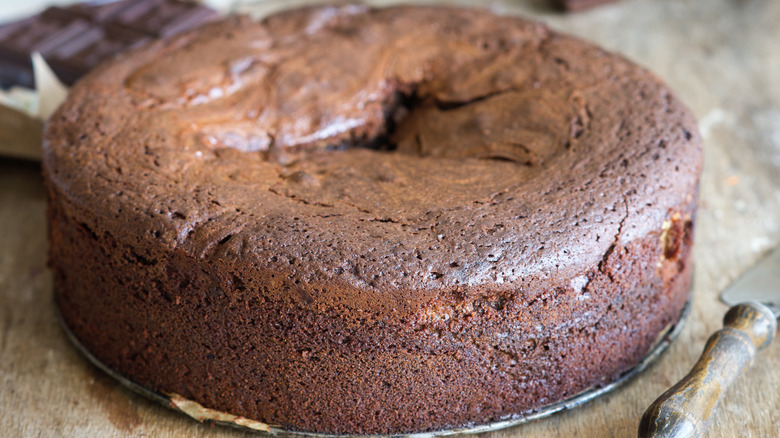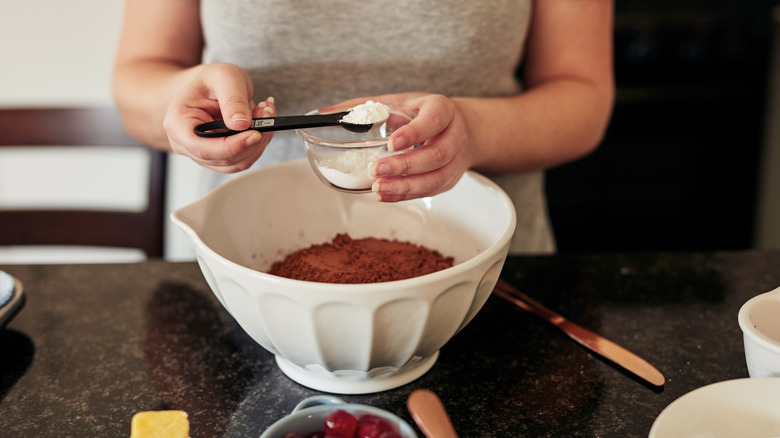The Ingredient Mistake That Causes Deflated Cakes
Appearances are always important when it comes to food, but this is doubly — nay, triply — true of cake. A cake should be the ultimate showstopper — eye-catching, photo-worthy, memorable from the very first glance, to say nothing of the first bite. There are few sights in the culinary world more depressing than a sunken cake. Putting in all that effort only to end up with a deflated dessert can make a baker feel equally deflated inside. Fortunately, avoiding sunken cakes is a cinch if you know what causes the trouble.
Many things can cause deflated cakes – using the wrong size or shape of cake pan, overmixing the batter, baking at the wrong temperature, not baking the cake long enough, and more. However, most of these pitfalls can be avoided if you stay true to the recipe and follow each detail. There's one mistake though, that can slip right past you. If you follow a recipe to a T and still end up with a sunken cake, it's probably because you used expired baking soda or baking powder.
Baking soda and baking powder are common leavening agents used in baking cakes. A leavening agent is any ingredient that introduces air bubbles into a batter or dough, making it rise. If you use baking soda or powder that has passed its prime, you won't get very many air bubbles in the mix, and your cake won't rise properly.
How baking powder and baking soda work (and why they go bad)
First, a quick primer on how baking soda and baking powder actually work. Baking soda, technically known as sodium bicarbonate, is a chemical with a high pH, making it alkaline. When sodium bicarbonate is mixed with an acid, it reacts to form bubbles of carbon dioxide — think of the classic volcano experiment you might have done in elementary school science class. Those bubbles are what make cakes rise and have a nice, fluffy texture.
Baking powder is just baking soda mixed with a powdered acid, typically cream of tartar. Many cake recipes include an acidic ingredient such as buttermilk to activate baking soda, but if a recipe doesn't call for anything acidic, you'll need to use baking powder and let the cream of tartar activate the sodium bicarbonate. Because they're almost the same, it's easy to substitute baking soda and baking powder.
Baking soda and baking powder don't spoil like some other foods, so it's not dangerous to use expired leavening agents, but you won't see much rise on your cakes. Baking soda and baking powder lose potency over time, especially when exposed to moist climates. Baking powder is especially vulnerable because it already has an acid built in, and all it takes to start the bubbly reaction is a little bit of moisture from the air.
How to maximize the shelf life of baking soda and baking powder
Packages of baking soda and baking powder typically list an expiration date of around 18-24 months after purchase. However, they can begin to lose their potency just six months after you open them, so it's important to regularly test baking soda and powder for freshness. To keep it fresh for as long as possible, you should store baking soda and baking powder at room temperature in a dry place, away from direct heat and light.
It's best to store both baking soda and baking powder in air-tight containers. Baking powder typically comes in an airtight container already because it is so vulnerable to moisture. Baking soda is less vulnerable, and typically comes in a cardboard box. These boxes cannot be resealed, so the baking soda inside them can soak up odors from other items in your pantry, causing even more trouble for your bakes. The best vessel for storing baking soda is a jar, and you can even use a spice jar with a shaker lid to make it more accessible.
If you find that your baking soda or baking powder has lost its potency, you'll need to replace it, but don't throw out the old stuff. Sodium bicarbonate is one of the most effective pantry ingredients to clean with. Even after they lose their rising power, baking soda and baking powder can be used to clean up around the house. Your cakes and your home will thank you.


